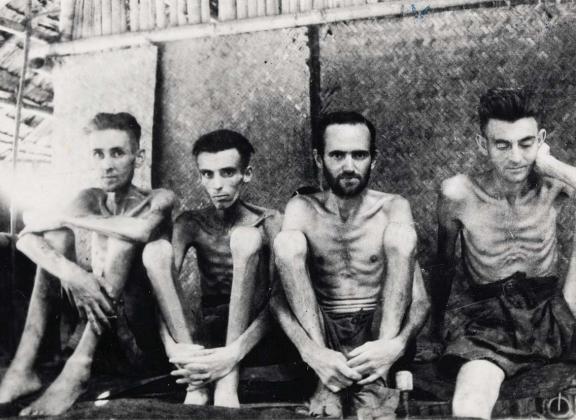In September of 1948, Mr and Mrs. Clifford England both residents of Dublin, returned from a reunion of fellow soldiers in Lubbock. Clifford was one of the “Lost Battalion” in Burma from 1942 to 1945. He survived 42 months of slave labor and starvation in a Japanese prison camp. He had been sent to Java on February 1 to help the Dutch and his battalion was not heard from again until the end of the war. (Dublin Progress, September 10, 1948) After they arrived in Thailand, the Japanese took over the island enforce and the island capitulated on February 8th. The captured men were sent to Burma and were forced to begin construction on a railway from Burma to Bangkok, Thailand.
While under gunpoint they were forced to build the railroad. The Americans were part of a group of 66,000 POWs. The railroad would cross mountains and harsh jungle for 258 miles. (Wikipedia, Lost Battalion, Pacific World War II) They were forced to work up to 20 hours a day and were only given steamed rice to eat. Daily beatings were the rule of the day. Malaria, diarrhea, dysentery, and other sicknesses struck the men, but sickness didn’t exclude them from work.
Steamed rice day after day, meal after meal for months was their constant diet. “To get meat, the men caught and ate snakes, lizards, dogs, monkeys, rats, whatever possible, and sometimes were able to steal food from their Japanese captors and locals. ( Dublin Progress, September 10, 1948) Liberation came when U.S. Troops arrived in Bangkok, Thailand August 29, 1945, over 3 years later.
The extraordinary experiences these men told about, was the basis of a book and a movie “The Bridge on the River Kwai.” The book and the movie are considered fictional since it deviates from the stories the men told. The members of the battalion didn’t like the movie because it didn’t portray the Japanese as brutal as they were. The Japanese didn’t like the movie because it said they didn’t have the engineering skills to know how to build a bridge.
Some research on the web shows that Clifford England and his wife moved to Fairfield, Texas after living in Dublin. The lost battalion group started to to have reunions each year. That tradition continues with their annual gathering of men, friends and family in Decatur, Texas. Only one man from the battalion is still living. (weplaythegame. us) The lost battalion was part of the Texas 36th Infantry Division and so most of the members were West Texas boys. They were prisoners of war for 42 months. The battalion was mobilized at Jacksboro, Texas and was shipped out of San Francisco in November 1941. Their ship, the USS Houston was out to sea during the Pearl Harbor attack. (usmilitariaforum.com)


